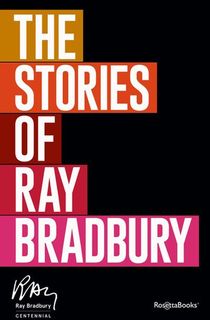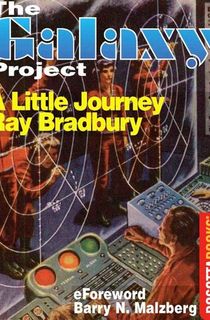The inimitable Ray Bradbury proved that short fiction can be uniquely powerful. In addition to his novels like Fahrenheit 451, the late author was also a prolific short story writer, distilling massive galaxies and the inherent conflicts of being human into concise but powerful narratives.
In his 91 years of life, the vast majority of which he spent actively writing, Bradbury wrote a staggering number of short stories—nearly 600. An overwhelming percentage of these stories are masterpieces. Given the quantity and quality of his work, it's impossible to select the best Bradbury short stories ever. However, the ones highlighted below are guaranteed to take your breath away.
If we’ve left off one of your favorite Ray Bradbury short stories, let us know in the comments below!
"The Veldt"

The Illustrated Man
This sci-fi story combines two reoccurring themes in Bradbury’s work: children's capacity for cruelty, and the insidious potential of technology. Originally titled “The World the Children Made,” the story follows a family with two children who live in an automated house called “The Happylife Home,” designed to anticipate their every need.
The children are increasingly transfixed by their nursery, a virtual reality room that transforms to meet their whims. When the virtual reality nursery begins to assume the appearance of an African veldt, complete with bloody battles between carnivores and their prey, the parents grow understandably unsettled.
Concerned by the violence of the world their children imagine in the nursery, the parents plan for the family to take a vacation away from The Happylife Home—but before they leave, the children want one last visit to the brutal world of their imagination.
"A Sound of Thunder"

The Golden Apples of the Sun
"A Sound of Thunder" has inspired a film adaptation, a video game, and changed the face of time travel fiction forever by helping to popularize the term 'the Butterfly effect.' The story follows Eckels, a wealthy hunter who forked over a lucrative sum to join a Time Safari Inc. expedition to the Cretaceous period to bag a coveted prize: a T-Rex.
The safari guides warn Eckels to stay on the path and avoid damaging the Cretaceous-era environment, because even small changes in this era could have a massive impact on their own timeline. Eckels tries to listen, but these precautions are easier said than done when actually faced with a T-Rex.
"The Next in Line"

The October Country
This understated and bone-chilling story follows a husband-and-wife couple vacationing in a small Mexican town. The husband is disquietingly eager to visit a macabre site: the vault where the mummified remains of the dead whose family couldn't afford a more permanent resting place are kept.
After their visit, the wife grows increasingly nervous about staying in the town, and in the vicinity of the unfortunate dead. As her anxiety and his nonchalance increase the gulf between them, she realizes that she may have far more to fear from her traveling companion than from the dead. A claustrophobic, truly unsettling story, "The Next in Line" is a reminder — from one of the greatest horror writers of all time — that sometimes when you're a woman, mortal men are far scarier than ghosts.
"The Fog Horn"

The Golden Apples of the Sun
"The Fog Horn" is quintessential Bradbury: Weird, strange, romantic, creepy, and full of empathy for creatures and things the average person wouldn’t consider twice. The story follows Johnny and his boss as the pair spend a harrowing night at a lighthouse, preparing for the almost-inevitable annual arrival of a sea monster.
The denizen of the deep believes the bellowing of the fog horn to be the lonely, searching cry of a potential mate. Although the monster causes considerable destruction, the story, and its human protagonists, have sympathy for the lonely creature, who may be the last of its kind.
"The Pedestrian"

Bradbury Stories
This eerie dystopian tale follows Leonard Mead, whose seemingly-innocent habit of taking walks through his town at night is considered aberrant. The year is 2053, and Leonard's fellow citizens are too occupied by their screens to be aware of the world actually unfolding around them.
The sidewalks have fallen into disrepair, but Leonard continues to take his meditative nightly walks. When police come across Leonard on one of his lengthy constitutionals, his behavior is seen as highly antisocial, and must be punished.
"The April Witch"

The Golden Apples of the Sun
This breathtaking fantasy story shows Bradbury's romantic side, and his talent for reminding us of the beauty in the everyday. The protagonist is Cecy, a 17-year-old witch who has the ability to temporarily possess the souls of all creatures.
Cecy knows that if she marries a human man, she will lose her extraordinary powers. But when she takes over the body of a woman named Ann during one of her nightly voyages—and winds up falling for Ann's acquaintance, Tom—the witch faces a bittersweet decision.
"All Summer in a Day"

A Medicine for Melancholy
A heartbreaking sci-fi story that again explores children's capacity for cruelty, "All Summer in a Day" is set on Venus. A classroom of children eagerly awaits a highly rare celestial event that will allow them to experience the sun for a few minutes, once every seven years.
Margot is a relatively new student who moved from Earth five years ago, and has first-hand experience with the sun. Tired of her boasts about the sun (read the room, Margot), the other students enact a prank that will have consequences they never intended.
"The Third Expedition"

The Martian Chronicles
One of Bradbury's many stories exploring potential relationships between Martians and humans, "The Third Expedition" follows Captain John Black and his crew on their journey to Mars. When they arrive at the unfamiliar and potentially terrifying planet, they're shocked to discover that Mars in fact looks like the typical American towns they came from.
Not only that, the Martian town is inhabited by their loved ones from Earth. Although understandably cautious at first, Black feels differently when he's greeted by his own family ...
The short story was adapted into numerous radio dramas, as well as an episode of The Ray Bradbury Theater.
"Kaleidoscope"

The Stories of Ray Bradbury
A brutal shot of sci-fi horror, this unrelenting story follows five astronauts after their ship is destroyed by a meteor. As each hurtles towards their separate deaths, they communicate with each other through their spacesuits in this story with a gutting ending.
"Jack-in-the-Box"

The October Country
This tragic story follows Edwin, a young boy who lives in a gated, sprawling house with his mother. Edwin's mother has raised him to believe that their home is the entire world, over which he will one day assume complete, god-like control. Edwin has been instructed by his mother — and his teacher, who looks an awful lot like his mother — that he's never to leave his house, because to do so would be to die, like his father before him.
Edwin respects their warnings: from the windows of his home, he can see the giant shiny beetles that pose danger outside of the Universe he's lived in his entire life. But after Edwin's birthday, something happens to his mother. The young god will have to venture into parts of the Universe he's never seen before, long before he's ready.
"The Emissary"

The Stories of Ray Bradbury
This story is classic Bradbury—scary, heartbreaking, and set during autumn. Martin, a young boy, is bedridden by illness. He finds solace in his dog (aptly named “Dog”), and in visits from his former teacher Miss Haight. When something horrible happens to Miss Haight, Dog finds a gruesome way to unite Martin and his teacher one last time.
The unsettling story was adapted for a 1988 episode of The Ray Bradbury Theater.
"The Playground"

The Playground
Many of Bradbury’s stories explore the simultaneous joy and terror of childhood. “The Playground” perfectly captures that tension.
Charles, a widower, is haunted by a traumatizing experience he had at the playground as a young child. He wants to spare his son Jim from the same horror, but Charles’ sister insists that playgrounds are an essential part of growing up. Will Jim—and Charles—survive this rite of passage?
"The Golden Apples of the Sun"

The Golden Apples of the Sun
The title story in a collection of the same name, “The Golden Apples of the Sun” is a brief but impactful portrait of an expedition sent to the surface of the to harvest some of its power. The crew of the spaceship Icarus face disaster in their quest to do the nearly-impossible.
"A Little Journey"

A Little Journey
A group of grandmas sacrifice their savings for a chance to meet God. First, they must spend a week on Mars, but then—a charismatic salesman promises them—they’ll jet off in a rocket to see Him for themselves. When their mission is postponed, the determined older ladies take matters into their own hands.
"The Lake"

The Stories of Ray Bradbury
At the close of summer, a young boy named Harold witnesses his childhood love Tally drown, but her body is never recovered. When he returns to the lake as an adult with his new partner, the water gives Harold back what he lost.
The haunting story was adapted into a comic in 1953 by Al Feldstein and Joe Orlando.
This post is sponsored by Open Road Media. Thank you for supporting our partners, who make it possible for The Portalist to celebrate the sci-fi and fantasy stories you love.






